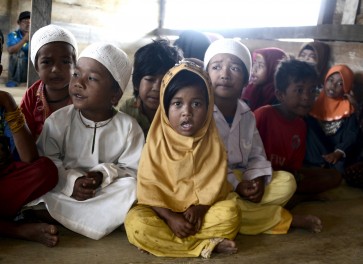Popular Reads
Top Results
Can't find what you're looking for?
View all search resultsPopular Reads
Top Results
Can't find what you're looking for?
View all search resultsCommentary: 'Pribumi' faiths shouldn't be pariah in their own country
Life has not been easy for native-faith followers. In modern Indonesia, they have been socially and legally considered secondclass citizens.
Change text size
Gift Premium Articles
to Anyone
 This photo taken on May 19, 2017 shows children from the 'Orang Rimba' tribe -- whose name translates as 'jungle people', who have been converted to Islam and given up their nomadic ways, wearing Islamic skullcaps and hijabs as they gather to recite the Koran, in the Batang Hari district of Jambi province. (AFP/Goh Chai Hin)
This photo taken on May 19, 2017 shows children from the 'Orang Rimba' tribe -- whose name translates as 'jungle people', who have been converted to Islam and given up their nomadic ways, wearing Islamic skullcaps and hijabs as they gather to recite the Koran, in the Batang Hari district of Jambi province. (AFP/Goh Chai Hin)
I
n many parts of the world, the debate over what constitutes a religion is just a matter of semantics, whereas the words “faith” and “religion” are often used interchangeably. As the old saying goes, one’s superstition is another man’s religion.
But in Indonesia, the subject has long become a contentious political issue that could determine whether or not one could be elected president, or to any kind of public post.
Great scholars on religion, like Reza Azlan, would argue that “faith” and “religion,” or “organized religion,” are two different things. Faith, they say, is constant, deeper and way more personal, while religion is changing, typically superficial, if not banal, and more impersonal.
But the debate over what makes one’s belief a religion or a superstition is far less scholastic in Indonesia, where religious beliefs are a major factor in politics. For decades, the state has been faced with the big question of whether it should consider native faiths as religions that are equal to their foreign, globalist counterparts that have culturally invaded the country for centuries: Islam, Christianity, Hinduism, Buddhism and Confucianism.
Indonesian ethnic groups had had their own belief systems — such as Sunda Wiwitan, Marapu or Parmalim — way before the great world religions came to the archipelago. They are seen as indigenous, or pribumi, to the country and many of their followers have survived centuries of systemic proselytization by the major religions.
Life has not been easy for native-faith followers. In modern Indonesia, they have been socially and legally considered secondclass citizens. The root problem lies in the fact that the state has been forced by the more dominant, hegemonic religions to distinguish “religions” and “faiths.”
While the 1945 Constitution recognizes their existence and guarantees the rights of their followers, native faiths are still considered inferior to the six major religions in legislation. In 1978, the People’s Consultative Assembly (MPR) issued a decree saying that native faiths “are not religions.” The decree further stipulates that native faiths should be managed “in a direction that they would not be made into new religions.”

















